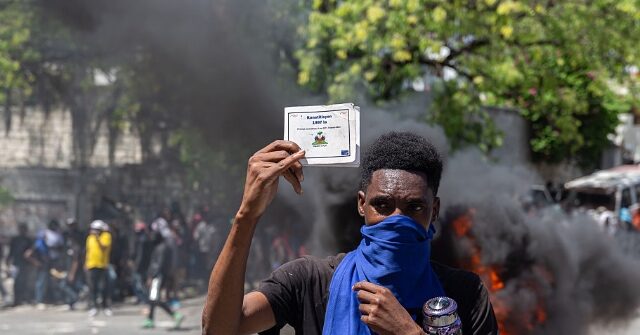Dozens of Haitians on Sunday marched through the streets of Port-au-Prince to demand the resignation of Interim Prime Minister Alix Didier Fils-Aimé and the Transitional Presidential Council amid an escalation of gang violence.
The protest was organized by the Mouvement Jeunesse Debout (“Standing Youth Movement”), a recently launched activist movement. The event was also promoted by Haitian hip-hop artist Stevenson Telfort, also known by the stage name Atròs.
“We need security, food, shelter, and healthcare. If you can’t meet these responsibilities, leave,” Telfort said during the march. He also called for the resignation of Haiti’s seven-member Transitional Council, which he accused of “inaction” in the fight against Haiti’s violent gangs.
Sunday’s protest took place shortly after a separate rally was held in Port-au-Prince to honor the law enforcement agents and civilians who died during a violent clash with gang members in the districts of Canapé-Vert and Pacot on April 23.
“The only thing the Haitian people are asking for is security,” 42-year-old bus driver Eric Jean said during the march. “We’re losing more and more neighborhoods, more and more people are dying, more and more people are fleeing their homes.”
Marc Étienne, a 39-year-old man that participated in the event, denounced that violent gangs attacked his small business and left him homeless. Étienne also denounced the current Haitian government for being responsible for the continuation of the violence and for the increase in the amount of youth who have joined the nation’s gangs.
“Haiti cannot be governed by friends,” Étienne said. “The city is dying because the council is doing nothing to improve the situation.”
The out-of-control gang violence in Haiti, which dramatically surged in 2024, has continued throughout 2025, with 1,617 people dead, 580 injured, and 161 kidnapped between January and March, according to United Nations (U.N.) estimates. In 2024, the U.N. documented at least 5,601 deaths, over 1,000 more than the deaths recorded in 2023.
Last week, the United States designated Viv Ansanm (“Live Together” in Haitian Creole) and Gran Grif (“Big Claw”) as foreign terrorist organizations. Viv Ansanm, headed by former police officer-turned gang boss Jimmy “Barbecue” Cherizier, leads the coalition of violent armed gangs that have taken control of large swathes of Port-au-Prince’s neighborhoods. Gran Grif, the largest gang in Haiti’s Artibonite Department, is responsible for 80 percent of civilian deaths in the area and has launched attacks against Haitian police officers and the Kenyan-led multinational security mission. In March, Cherizier promised a “violent reprisal” after law enforcement agents raided his stronghold in the capital city’s Delmas neighborhood.
On Monday, U.S. Ambassador to the Republic of Haiti Dennis B. Hanskins spoke with the Haitian newspaper Le Nouvelliste and other local outlets to explain the implications of the designation of both gangs as terrorist organizations. Hanskins described it as an “important step” in blocking the gangs’ access to weapons, ammunition, and funding.
“With this designation, gangs and those who support them are in contravention of American law. The designation gives U.S. agencies many more opportunities to prosecute criminals,” Hanskins said.
The U.S. diplomat explained that the vast majority of weapons used by Viv Ansanm and Gran Grif come from the United States and that, as a result of the terrorist designation, arms and ammunition exports from the U.S. to Haiti will not be treated as a violation of export regulations, but as “support for a terrorist group.”
“It’s the same for money laundering and for people involved in drug trafficking. It’s in that sense that all gang members can be prosecuted. The scope of crimes is much broader,” Hanskins said, stressing that Viv Ansanm and Gran Grif “pose a threat to Haiti, to the United States of America and to the entire region.”
“We believe this designation will protect the security of Haitians, the security of the U.S., and the security of all neighbors here in the Caribbean and other regions,” he added.
Christian K. Caruzo is a Venezuelan writer and documents life under socialism. You can follow him on Twitter here.
Read the full article here



